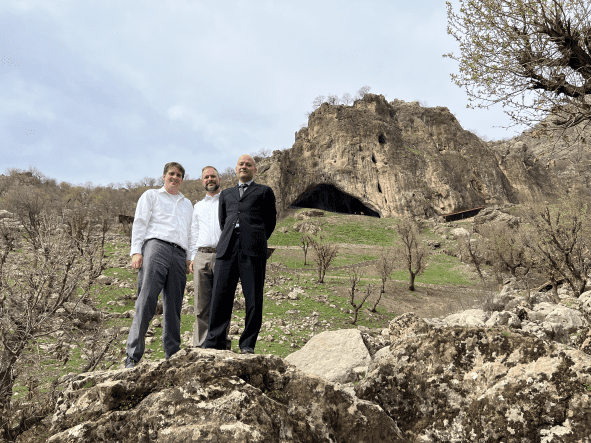A New Beginning: Model United Nations in Iraq and Kurdistan Regional Government

(From Left to Right) Dr. Nikola Mirilovic, Dr. Tyler Fisher, Dr. Güneş Murat Tezcür pose in front of Shanidar Cave in Goratoo, Iraq. They visited this popular site after participating at Soran University’s Model United Nations Conference from March 31 to April 2, 2022.
By Léa Faure
In close partnership with the Kurdish Political Studies Program (KPSP) at the University of Central Florida (UCF), Soran University in Iraqi Kurdistan hosted the first Model United Nations Conference in Iraq from March 31 to April 2, 2022. Around 100 students from different parts of Iraqi Kurdistan and Iraq as well as a number of diplomats were present including Matthew H. Tueller, the U.S. Ambassador to Iraq and Robert Palladino, the U.S. Consulate General in Erbil, civil servants and scholars. UCF was represented by a delegation composed of Dr. Güneş Murat Tezcür, Director of SPSIA and Jalal Talabani Chair of Kurdish Political Studies, Dr. Tyler Fisher, Associate Professor at Department of Modern Languages and Literature and Dr. Nikola Mirilovic, Associate Professor at SPSIA.
This conference was the culmination of a longer partnership between KPSP at UCF and Soran that has been funded by the U.S. Department of State and the International Research and Exchanges Board (IREX). UCF provided Soran University’s faculty members and conference delegates with various forms of virtual training since late 2020.
The main purpose of the conference was to teach selected Kurdish and Iraqi students how to address critical community issues through diplomacy and negotiations. Five topics central to global affairs were covered during the conference: women’s political participation, clean and renewable energy, access to education, youth economic development and justice for the victims of the self-declared Islamic State. Other themes covered in the conference ranged from the importance of forging future Kurdish and Iraqi foreign policy leaders, discussing higher education in the region, the centrality of Model UN, the comparative dynamics of migrations and/or the importance of Kurdish-American cultural exchanges.
The conference was also a perfect occasion to cultivate long-lasting networks among students with different backgrounds as well as developing U.S.-Kurdish and Iraqi academic links. As per the opening remarks of Dr. Tezcür, the conference aimed to enable students to become global citizens and transcend their identities in order to find common ground with people from different backgrounds in order to make compromises and face global concerns and challenges. Hannah Barnes, the current Dr. Najmaldin Karim Research Fellow in Kurdish Political Studies and undergraduate student at the School of Politics, Security, and International Affairs, also attended the conference in person while spending a semester at the American University in Cairo. When recalling the conference, Hannah noted that students were very curious and interested in studying abroad to develop their horizons, as encouraged by the Model UN system.
The conference has had a lasting impact on student participants and paved the way for similar future events in Iraqi Kurdistan and Iraq. It has been a milestone for future generations of Kurdish and Iraqi leaders who will benefit from the academic, professional and cultural opportunities offered by the Model United Nations.
